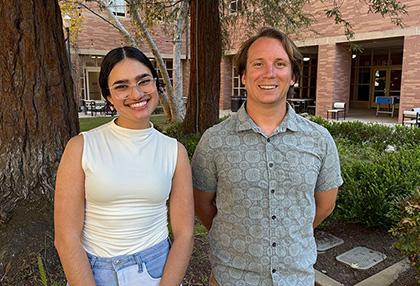UCLA Law students help write state bill targeting air pollution
The bill is expected to get its first hearing in the Senate Environmental Quality Committee on April 23.

If you’re driving north through L.A.’s San Fernando Valley on I-5 and look left at Sun Valley, you can see a major source of air pollution hiding in plain sight. Giant mounds of crushed concrete loom like towers from scrap yards that are called aggregate recycling facilities.
That’s where demolition is trucked, dumped and processed to turn it from waste into reusable construction material. While recycling is better than sending this material to a landfill, particulate matter can be spewed from these businesses into nearby yards. Local officials and residents point to the chalky residue that accumulates on car windshields and the windows of houses. More recently, debris from the recent Palisades fires has also been taken there, according to government officials and private waste haulers at a recent town hall.
Maya Hernandez ’26 never noticed these stockpiles until she enrolled in a class at UCLA School of Law that assigns students to work with state legislators on tricky environmental issues and potential legislative solutions. “Through research and stakeholder meetings, our UCLA Law team helped determine that a significant regulatory gap has enabled facilities to suffocate surrounding neighborhoods with particulate matter pollution for years with little to no oversight,” Hernandez explains.
Backed by this UCLA research, State Senator Caroline Menjivar, who represents the San Fernando Valley, has proposed a new bill that would address this aggregate pollution. “We want to make sure we have good neighbors and that we don’t have high-rise stockpiles,” Menjivar said in a video posted to social media in February.
The bill, known as SB 526, would empower local air regulators to be more vigilant. In short, the bill would require the South Coast Air Quality Management District to update its regulations for aggregate and aggregate-related facilities with the directive that facilities monitor dust pollution and implement specific design elements.
It might seem unusual that a student research project would yield real-world legislation, but it’s actually the point of the class, the California Environmental Legislation and Policy Clinic. In its six years, the clinic has helped get major pieces of legislation across the finish line on topics ranging from reducing single-use plastic to making the state’s management of groundwater more equitable.
When Hernandez and classmate Ian Bertrando ’26 were paired with Sen. Menjivar’s office, the aggregate pollution plaguing her district was one of the issues the senator brought to their attention. The students looked at the health risks of living, working and playing near these concrete and asphalt crushing operations and the patchwork of government regulators and regulations that apply to these facilities. They collected a list of over 300 aggregate recycling facilities in Southern California — nearly a dozen in the San Fernando Valley. Then the student team did deep-dive legal research to determine how local air regulators could do more to place limits on the giant concrete stockpiles and to monitor particulate matter that drifts from aggregate facilities to nearby houses, playgrounds and schools. That work led to SB 526, which was introduced in February and is expected to get its first hearing in the Senate Environmental Quality Committee on April 23.
The students’ involvement isn’t over, though. Bertrando and Hernandez are expected to be called as expert witnesses to give testimony before the committee. They say they’re excited to experience the process and to see what happens to the bill that culminated from their research. “With L.A.’s long history of air quality challenges, Angelenos can be proud of the progress in cleaning up our air while also acknowledging that this progress hasn’t been equitably distributed,” Bertrando says. “This bill is a next step toward protecting those communities that live near a disproportionate number of industrial businesses.”
Helping UCLA Law students prep and testify at high-stakes legislative hearings in Sacramento is one of the best parts of the job, says Julia Stein, who directs the clinic. “It’s incredibly rewarding to watch the students — who have become true experts after months of research — educate legislators about critical environmental issues,” Stein says.
Read more about the bill in this blog post.
-
J.D Environmental Law